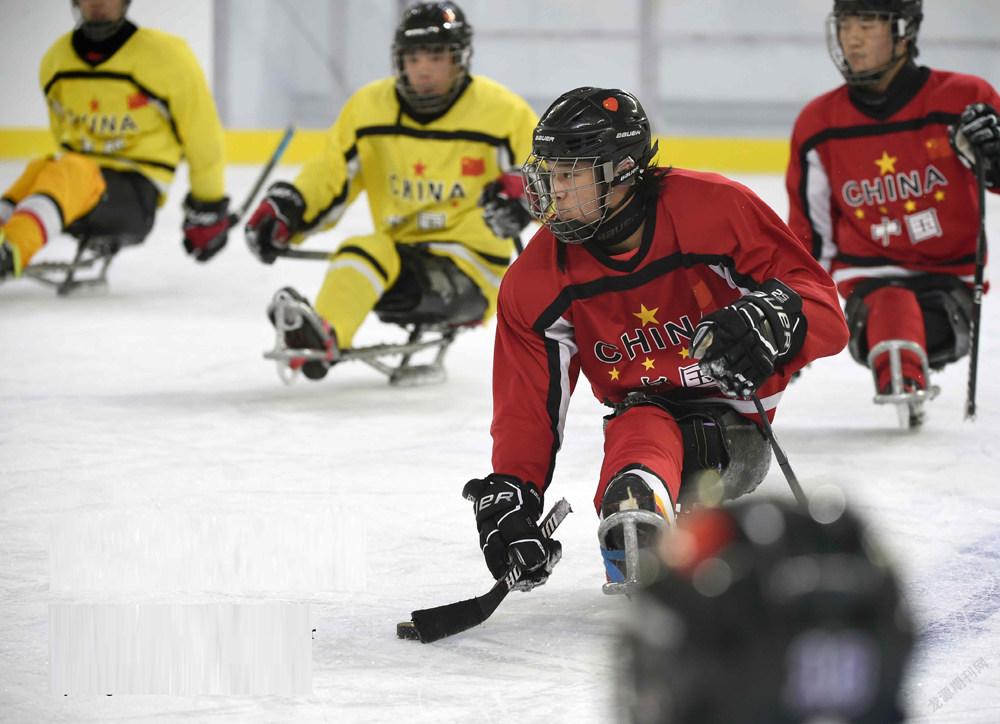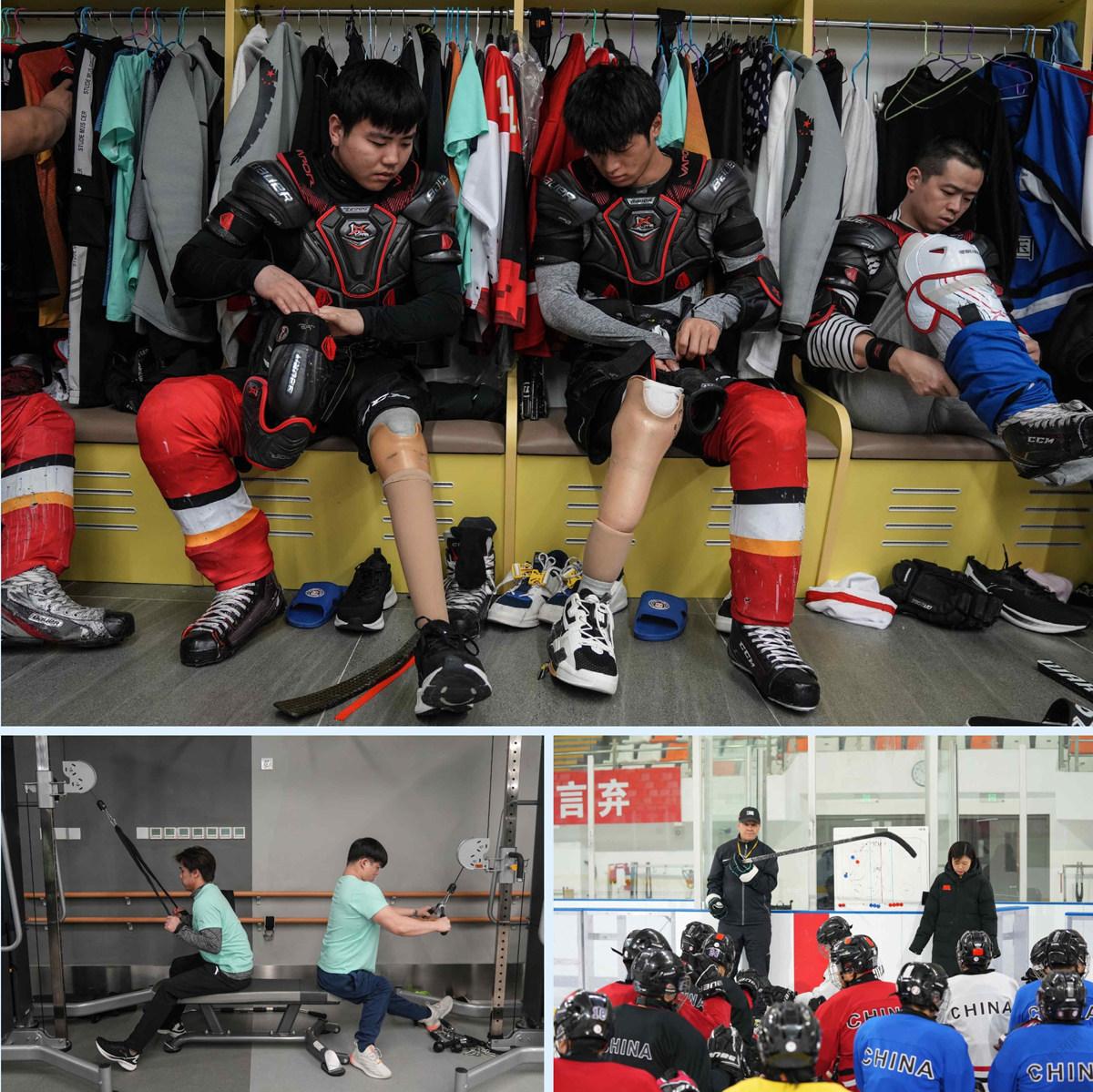IRON WILL
Wang Zhe


China’s first Para ice hockey team to compete in the Winter Paralympics is ready to skate
On an ice hockey rink in suburban Beijing, a group of fully-equipped players on sledges practice skating back and forth, turning, crossovers, abrupt stops, and puck control. The protective glass offers little respite from the loud noises from friction and collisions between the sledges, creating a highly charged atmosphere.
The players are members of China’s first Para ice hockey team to compete in the Winter Paralympics. The team is now making final preparations for the upcoming event after extensive training in Qingdao, Shandong Province, every day for the last four years. Everyone in the team is determined to make their Olympic dream come true.
Never Give up
Ice hockey is considered one of the world’s most competitive and fastestpaced team sports. The sport requires considerable physical strength especially for disabled people, which makes Para ice hockey, formerly known as ice sledge hockey, one of the most popular spectator attractions of the Paralympic Winter Games.
Similar to the rules for able-bodied athletes, Para ice hockey allows body checking to regain possession of the puck using the shoulder, torso, or hip, making the event quite physically challenging.
A Para ice hockey game usually involves players with lower-body disabilities sitting on sledges with blades mounted under the bucket while using sticks with teethed picks to navigate the ice and a curved blade on the other end to control, advance, and shoot a puck into the other team’s goal. Effective teamwork is needed to score and block the opponent’s passes and shots. To execute a quick defenseoffense transition through skilled maneuvers on their sledges, Para ice hockey players usually have excellent balance, physical agility, and upperbody strength.
Invented in the 1960s, Para ice hockey made its Paralympic debut at the 1994 Winter Games in Lillehammer, Norway. The sport was not systematically developed in China until 2015 after Beijing won the bid to host the 2022 Paralympics. Thanks to joint efforts by China Disabled Persons’ Federation and the city of Qingdao in Shandong, one of the first provincial regions in China to promote the team ice sport, the Chinese national Para ice hockey team was established, but remained unknown to the public for some time.
In May 2018, He Yi, a senior photojournalist with 20 years of career experience, jogged past a group of young people in sportswear going in and out of Qingdao Guoxin Sports Center who piqued his interest. He noticed that the young men had exceptionally muscular arms despite physical impairment to the lower part of their bodies. The photographer later learned that they were training members of the newly-organized national Para ice hockey team, from which outstanding players would be selected to represent China in competition at the 2022 Paralympic Winter Games.
He Yi was so interested in their story that he decided to start recording the training sessions with his camera. With permission from the team’s supervisor, the experienced photojournalist was deeply touched when he began watching their training up close.
Strapped to specially-designed sledges, a dozen players maneuveredskillfully across the ice. When crashing into each other at full speed, they and their mobility devices were often thrown several meters away. With their sticks, they managed to get right back up. During the training session, players fell onto the ice over and over again, but no one ever gave up. Next to the boards surrounding the ice rink were wheelchairs and prostheses.
“When God closed a door, ice hockey opened a window for these people,”sighed He Yi. Touched by their fighting spirit, the photographer followed the national team from Qingdao in May 2018 to their 2022 training camp in Beijing and captured many of their precious and wonderful moments toshare with the public.
‘We Are Lucky’
China’s national Para ice hockey team has engaged in high intensity training since its establishment. The team members spent the past few years commuting between the hotel and the venue for two training sessions a day, each lasting one and a half hours.
Para ice hockey players always wear equipment such as helmets, throat protectors, and shoulder pads for protection during training, but the frantic pace still leaves bruises all over their faces and arms and sometimes even fractured bones. They also face the risk of being hit by teammates’ sticks. After every highly intensive session, the team members looked exhausted and were soaked in sweat.
With daily inconveniences to overcome and families to support, athletes with physical impairments usually have to make major arrangements before joining the national team. Some previously practiced competitive parasports such as track and field, cycling, taekwondo, and archery, while others worked non-sports related jobs ranging from repairing prostheses to video editing and running small businesses like a lottery shop.
After being selected for the national Para ice hockey team, they all quickly fell in love with the sport. To make their Olympic dream come true, the team members managed to overcome challenges such as meager income, little field experience, and isolation from their families and friends for long stretches of time. Born in a small village, 36-year-old winger Cui Yutao was formerly captain of the Shandong provincial Para ice hockey team. Despite suffering recurrent injuries, he rose to captain of the national teamthanks to years of relentless pursuit of his dream. Xu Jinqiang, a 31-yearold former practitioner of archery and rowing, has never regretted his decision to resign his position as a social media editor at a decent income. Wang Zhidong, who joined the national team as the youngest member at the age of 15 five years ago, has grown into a strong, fast young man. His excellent puck control helped him become the team’s top scorer. At 38, Yu Jing is the only female player on the team and has rich field experience in fencing, sitting volleyball, and wheelchair basketball despite never before competing in a Paralympic event.
China’s national Para ice hockey team was organized only after Beijing won the bid to host the 2022 Winter Paralympics. Starting from scratch, tireless efforts by the players have translated into rapid progress and an unexpected rise to one of the topranked teams in the international arena.
At the 2018 PyeongChang Paralympic Winter Games, the Chinese wheelchair curling team won China’s first gold medal in the event. Their success inspired members of the Para ice hockey team. “Many athletes never make it to the Olympic Games throughout their sporting career, but we are so lucky to get the chance after only five years of practice, so we must work as hard as possible,” said one team member, echoing the feelings of many.
In November 2018, the Chinese national team placed first at the 2018 World Para Ice Hockey Championship C-Pool after defeating Australia and Finland, which helped the team get promoted to Pool B for the 2019 event. In September 2021, China secured first place at the 2021 World Para Ice Hockey Championships B-Pool to qualify for the Paralympic Games in Beijing.
Strong Team Spirit
On July 12, 2021, members of the Chinese national Para ice hockey team departed Qingdao, where they had been training and living for four years, for Beijing to prepare for the Beijing Paralympic Winter Games. The team currently has 23 players at an average age of 25.
Led by head coach Nikolai Sharshkov from Russia, the Chinese national team has achieved remarkable results at international events. Eight years ago, the Russian coach helped the Para ice hockey team representing his country secure a silver medal at the 2014 Sochi Winter Paralympics.
Since the outbreak of the COVID-19 pandemic, the Chinese national team had participated in only a few high-level events. To help this young team stay competitive and gain competition experience, Sharshkov started organizing mock matches to strengthen physical and tactical training while watching videos of top teams in competition to understand their advantages and weaknesses, according to deputy team captain Wang Jianbin.
Wang was confident in his team’s prospects at the upcoming Paralympic ice hockey event. He noted that Chinese players are usually not as strong as opponents from Europe and North America, but they are good at quick attacks and amazing agility. “Competing at home, our goal is to place among the top six teams and we’re striving for top three,” Wang revealed. “Our players have developed a team spirit strong enough to face powerful teams from Russia and the United States, and I believe this adequately represents the Olympic spirit.”
- 中国东盟报道的其它文章
- Mainland Medical Experts Continue Inspection of Hong Kong’s Anti-COVID Work
- Lao Leader Speaks Highly of China-Laos Railway
- Chinese Foreign Minister Holds Discussion with Singaporean Counterpart
- Chinese-aided National Road Inaugurated in NE Cambodia
- Thai Health Authorities Approve Sinovac, Sinopharm Vaccines for Use in Children
- VOICES

